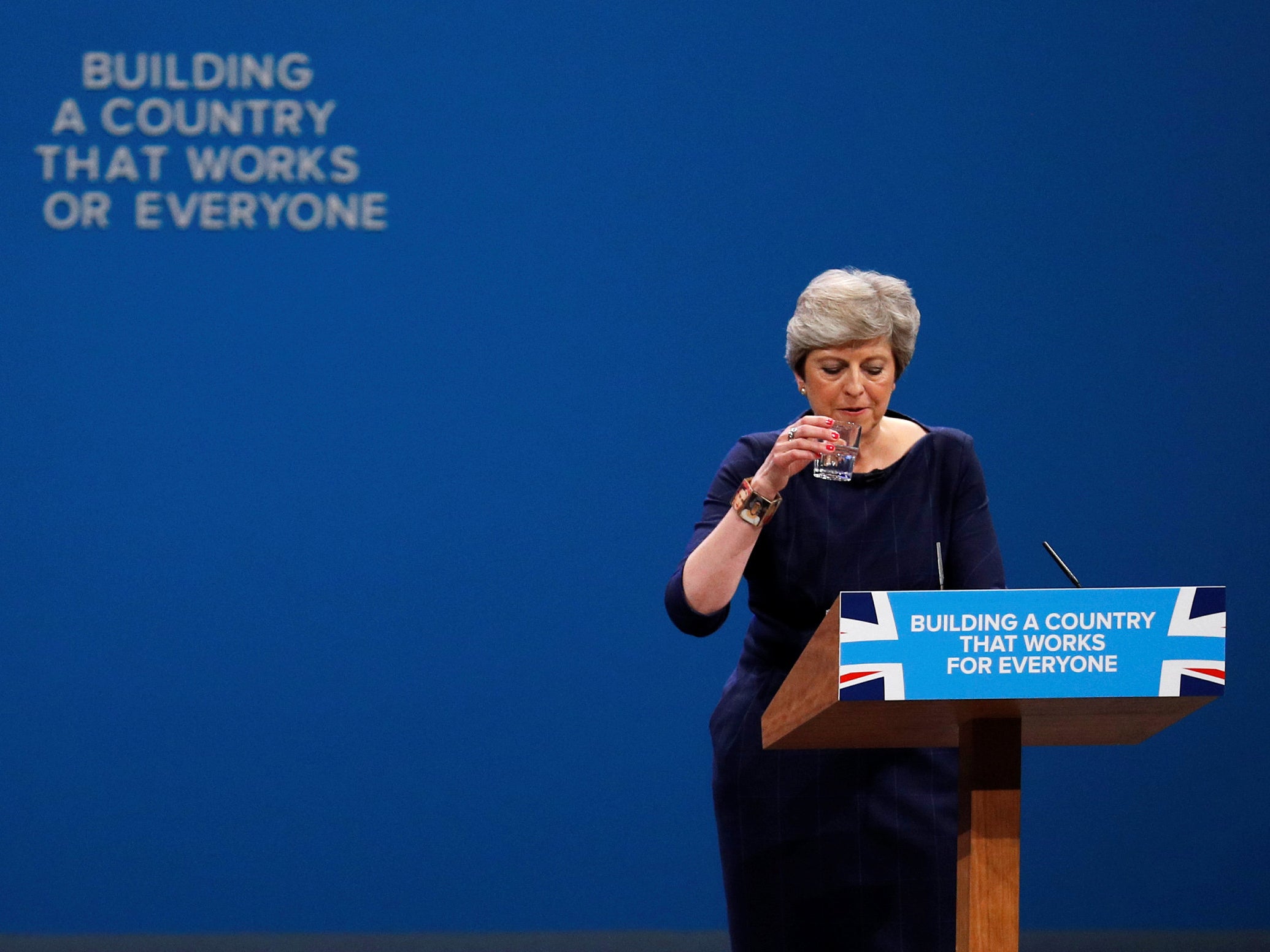Theresa May promises to 'put a price cap on energy bills' in latest u-turn during conference speech
Prime Minister vows to end ‘rip-off fees’ in extraordinary conference speech interrupted by prankster with P45 form

Theresa May has promised to put a price cap on “rip-off” energy bills, reversing the U-turn that saw her abandon the idea just a few months ago.
The Prime Minister said the existing price system “punishes loyalty with higher prices” hitting “people on low incomes, the elderly and people with low qualifications” as she unveiled plans to give energy regulator Ofgem the power to cap standard variable tariffs.
In an extraordinary speech interrupted by a prankster and where she struggled with a persistent cough, Ms May accused energy giants of hiking bills for customers who do not shop around for a better deal.
Plans for a form of energy bill cap for households were included in the Tory manifesto but Ms May passed responsibility on to Ofgem, which was then accused of watering proposals down to cover only the poorest value tariffs. The idea was also left out of the Queen’s Speech in June.
Nearly 80 Tory MPs, including several former ministers, signed a cross-party letter last week urging the Prime Minister to resurrect the cap over concerns that millions of customers are being ripped off by energy giants.
Addressing the Tory party conference, Ms May said: “While we are in favour of free markets we will always take action to fix them when they are broken. We will always take on monopolies and vested interests when they are holding people back.
“One of the greatest examples in Britain today is the broken energy market. The energy market punishes loyalty with higher prices and the most loyal customers are often those with lower incomes, the elderly, people with lower qualifications and people who rent their homes.
“Those who, for whatever reason, are unable to find the time to shop around.
“That’s why next week this government will publish a draft bill to put a price cap on energy bills, meeting our manifesto promise and bringing an end to rip-off energy prices once and for all.”
Shadow Business Secretary Rebecca Long-Bailey accused Ms May of making hollow promises as she pointed to a lack of detail on how the cap would be delivered.
She said: “Today, after pressure from Labour and her own backbenchers, Theresa May has finally been forced to recognise that the energy market is broken. But her response doesn’t go nearly far enough.
“It is unclear if responsibility for action has again been passed to Ofgem, with no commitment on when or how action will be taken. Yet again the country is left confused about whether the Prime Minister will honour her election promise.”
The move also prompted a swift backlash from business leaders and triggered a slump in the share price of energy firms.
CBI director general Carolyn Fairbairn said: “Affordable energy matters for everyone and particularly for the most vulnerable.
“However, today’s announcement is an example of state intervention that misses the mark. Market-wide price caps are not the best answer.
“Suppliers are already acting, providing support to those on pre-payment meters, and continued action to phase out standard variable tariffs would benefit a wide range of consumers, including those on the lowest incomes.”
Adam Marshall, of the British Chambers of Commerce, said: “Businesses will be confused by the Prime Minister’s commitment to free markets, on the one hand, and her stated intention to intervene in the energy market, on the other.
“Attention must be paid to avoid unintended consequences that drive up costs to consumers or businesses.”
However the move was welcomed by Citizens Advice chief executive Gillian Guy, who said: “The Prime Minister’s announcement of a cap on energy bills could provide a solution to the runaway energy costs that the millions of people on default tariffs have faced for years.”
Lawrence Slade, chief executive of the trade association Energy UK, said more than three million consumers had switched already this year and the number of standard tariffs had fallen by almost a million in the last six months.
He said: “It is important that we do not risk halting this growth of competition and engagement in the market.”
Join our commenting forum
Join thought-provoking conversations, follow other Independent readers and see their replies
Comments
Bookmark popover
Removed from bookmarks